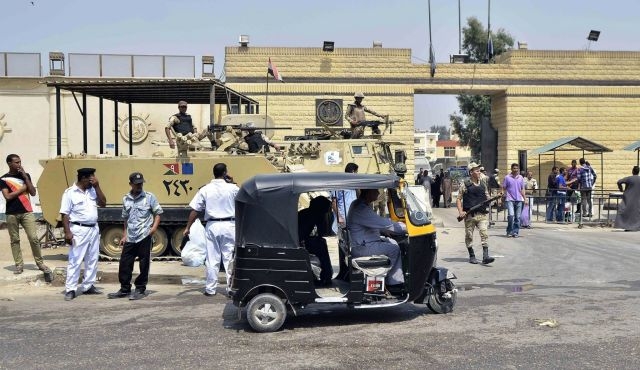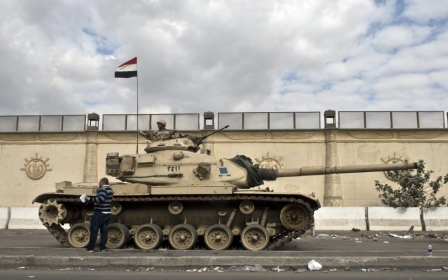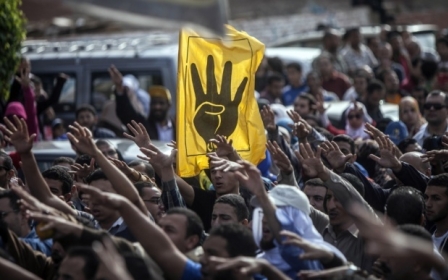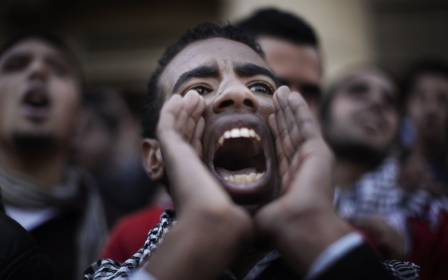Sisi win sparks protests in Egypt

Egyptian security forces in several provinces used teargas and birdshot to disperse Friday protests by supporters of ousted president Mohamed Morsi and arrest a number of demonstrators, eyewitnesses and security sources have said.
According to eyewitnesses and medical sources, security forces fired teargas and birdshot on a pro-Morsi rally in the central Fayoum province, leaving two suffering birdshot wounds.
A number of protesters were arrested and others injured when security forces used teargas to break up a pro-Morsi march in Upper Egypt’s Minya province, security sources said.
Anti-riot police also broke up similar protests in Beni Sueif and Alexandria.
A statement by the Alexandria security directorate said that at least 25 protesters had been arrested in possession of "subversive flyers, fireworks, Molotov cocktails and blunt instruments".
New MEE newsletter: Jerusalem Dispatch
Sign up to get the latest insights and analysis on Israel-Palestine, alongside Turkey Unpacked and other MEE newsletters
Clashes were also reported in the Giza province, west of Cairo, between security forces and Morsi supporters, which left an undetermined number of the latter injured, eyewitnesses said.
Friday's rallies come as part of week long demonstrations called by the pro-Morsi National Alliance for the Defence of Legitimacy to protest presidential poll results giving former army chief Abdel-Fatah al-Sisi a whopping 96.7 percent of the vote.
Similar rallies and human chains were staged in the canal cities of Ismailia, Suez and Port Said and in the Nile Delta provinces of Damietta and Sharqiya.
In capital Cairo, protesters took to the streets of the eastern 5th Settlement, Nasr City, Ain Shams, Shubra al-Kheima and Helwan districts, raising Morsi posters and waving Egyptian flags.
While a few injuries have been reported from the protests, one person was killed when an explosive device exploded in eastern Cairo on Friday, an Egyptian security force said.
The bomb exploded at a motorbike in the al-Doweika district, injuring the driver, who later succumbed to his wounds, the source said.
According to the source, the bomb went off as the driver, an alleged Muslim Brotherhood member, planned to use it in attacking police facilities.
Results provided by 13,893 polling stations across Egypt showed al-Sisi winning some 23.5 million votes, while his competitor, leftist Hamdeen Sabahi, won only 791,153, or 3.3 percent of the total, according to a tally by Anadolu Agency.
Opposition groups cast doubts on the results, however, saying that only some 10 percent of Egypt’s registered voters had bothered to cast ballots for either candidate.
The vote, which wrapped up Wednesday, comes as part of an army-imposed roadmap for Egypt’s transition.
Sisi led the army to oust Morsi - Egypt’s first freely elected president – following mass protests last July against the Islamist leader.
While critics describe Morsi's ouster as a "military coup", supporters call it an "army-backed revolution"
The Coalition of Rights Organisations for Freedom announced on Friday that a hunger strike in solidarity with detained Muslim Brotherhood prisoners now includes at least 5,000 families of detainees, according to reports in al-Arabi al-Jadid.
The first statement by the High Commission for the Prison Uprising, published on 30 May, reports that the uprising will continue for a week, “in order to force the powers behind the military coup to respond to our demands.”
A recent report by the Egyptian Centre for Economic and Social Rights (ECESR), a local NGO, documented over 21,000 alleged cases of individuals who had been subject to prosecution since the 3 July ouster of elected president Mohamed Morsi by the military.
There have been reports of widespread and systematic mistreatment and torture being carried out in Egyptian detention facilities.
Egyptian authorities often deny claims of maltreatment inside prisons.
The military-backed government also denies the presence of any "political" prisoners in the nation's jails, saying the thousands arrested since Morsi's ouster face criminal charges.
Seif al-Din Abdel Fattah, a professor of political science at Cairo University, told al-Sharq in an interview on 29 May that 41,600 people have been detained as a result of the coup that ousted Morsi, held in army and security facilities as well as civilian prisons.
The hunger strike is gaining ground on social media, with the hashtag #انتفاضة_السجون or #prisonuprising attracting hundreds of updates and pictures of the strike and its supporters.
[The protestors' T-shirts read "Freedom for the detainees"]
Middle East Eye delivers independent and unrivalled coverage and analysis of the Middle East, North Africa and beyond. To learn more about republishing this content and the associated fees, please fill out this form. More about MEE can be found here.




